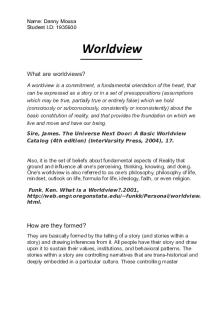Philosophical Worldviews PDF

| Title | Philosophical Worldviews |
|---|---|
| Author | Julius Munene |
| Course | Philosophy of Religion |
| Institution | Liberty University |
| Pages | 5 |
| File Size | 96.4 KB |
| File Type | |
| Total Downloads | 86 |
| Total Views | 154 |
Summary
Philosophical Assumptions and Research
Each of us has unique experiences and perceptions that shape what we believe about the world. These beliefs and underlying assumptions affect our natural approach to research. Some philosophical worldviews are more congruent with qualitative resea...
Description
Running head: PHILOSOPHICAL WORLDVIEWS
Philosophical Worldviews Name Institutional Affiliations Date
PHILOSOPHICAL WORLDVIEWS
Philosophical Worldviews 1.
Which philosophical worldview most closely aligns with your perspective and the way that you view problems in the world? How so? Philosophical worldviews refer to a basic set of beliefs that guide actions. Four distinguishable philosophical worldviews exist: post-positivist (positivist), interpretivist (constructivist), participatory (advocacy), and pragmatist. Each of these worldviews offers an outstanding perspective of the world[ CITATION Joh09 \l 1033 ]. However, the participatory worldview which is intertwined with politics and political agenda closely aligns to my perspective of the world problems. It is through the participation and intervention of the world problems that most change is achieved. My ultimate goal is to transform the world into a place where children, youths, adults, and the aged feel they are all embraced. It’s through intervention that social, political, and economic problems can be solved. Through this perspective, problems such as inequality, alienation, suppression, domination, oppression among others can be addressed to make this world a culturally sensitive and comfortable place to live.
2.
Of the four philosophical worldviews, which ones are aligned with qualitative methodology? Philosophical worldviews are essential in the way they influence research. According to Creswell (2009), the different philosophical worldviews are important in determining what kind of research method to apply. In this case, the focus remains on the philosophical worldviews that are aligned to qualitative methodology. Among the four philosophical worldviews, three of them are aligned with qualitative methodology. The constructivist worldview is typically viewed as a qualitative research approach[ CITATION Joh09 \l 1033 ]. The participatory worldview that holds on assumptions of imposed laws is a worldview that similarly fits qualitative research.
PHILOSOPHICAL WORLDVIEWS
However, according to Creswell (2009), this worldview can also be aligned with quantitative methodology as well. Finally, the similar to participatory worldview, pragmatic worldview is ultimately aligned with qualitative methodologies, but can also embrace quantitative methodologies. 3.
How does understanding the connection between philosophical worldview and research methodology assist in your research approach? The knowledge and ability to connect philosophical worldviews to various research methodologies is vitally important to me. By understanding the connection between the two, it becomes easier to focus on the center of the research onion where making the right choice on what kind of data collection techniques to apply and the kind of data analysis procedures to apply. By focusing on this vital connection, it becomes easier to answer the prime important question on which research method applies to my research.
4.
Compare/contrast philosophical worldview with that of a Christian worldview. Are there any areas that are problematic or do most philosophical worldviews appear to be congruent with a Christian worldview? A worldview is the window through which we make sense of life and the world, and more importantly, view reality. The Christian worldview is a broad conceptualization of the world based on a Christian view. It affects every aspect of life, from sociology to psychology, from law to economics, and from science to philosophy. The basic tenets of Christian and philosophical worldviews are rational since they are based on the perception of the average rational people. The fact that the two worldviews tend to conflict is the same reason why they tend to be tied together. Knowledge gained from Christianity and the one gained from philosophy in view of life requires faith. The basic problem with philosophical worldview is not
PHILOSOPHICAL WORLDVIEWS
the problem of reason versus faith, the main problem is that some thinkers rely on assumptions in their pursuit for the truth about the world. Both worldviews rely on historical evidence to develop evidence of the world around them. Conclusively, both the Christian worldview and the philosophical worldviews embrace the meaningful and purposeful life in which one can shape their beliefs based on a coherent, truthful, and reasonable worldview. The implication of this statement is that none of these worldviews can be tossed by the contending views of the other.
PHILOSOPHICAL WORLDVIEWS
References Creswell, J. W. (2009). Research design: Qualitative, Quantitative, and Mixed Methods Approaches. . Thousand Islands, CA: Sage Publications....
Similar Free PDFs

Philosophical Worldviews
- 5 Pages

What are worldviews
- 3 Pages

Philosophical Game Design
- 2 Pages

Steinberg the philosophical brothel
- 69 Pages

The philosophical activity
- 10 Pages
Popular Institutions
- Tinajero National High School - Annex
- Politeknik Caltex Riau
- Yokohama City University
- SGT University
- University of Al-Qadisiyah
- Divine Word College of Vigan
- Techniek College Rotterdam
- Universidade de Santiago
- Universiti Teknologi MARA Cawangan Johor Kampus Pasir Gudang
- Poltekkes Kemenkes Yogyakarta
- Baguio City National High School
- Colegio san marcos
- preparatoria uno
- Centro de Bachillerato Tecnológico Industrial y de Servicios No. 107
- Dalian Maritime University
- Quang Trung Secondary School
- Colegio Tecnológico en Informática
- Corporación Regional de Educación Superior
- Grupo CEDVA
- Dar Al Uloom University
- Centro de Estudios Preuniversitarios de la Universidad Nacional de Ingeniería
- 上智大学
- Aakash International School, Nuna Majara
- San Felipe Neri Catholic School
- Kang Chiao International School - New Taipei City
- Misamis Occidental National High School
- Institución Educativa Escuela Normal Juan Ladrilleros
- Kolehiyo ng Pantukan
- Batanes State College
- Instituto Continental
- Sekolah Menengah Kejuruan Kesehatan Kaltara (Tarakan)
- Colegio de La Inmaculada Concepcion - Cebu










